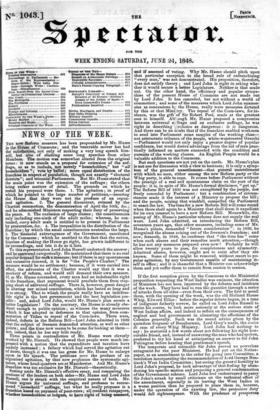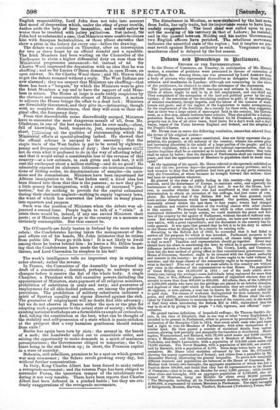If the first reception given by the Commons to the
Ministerial proposition respecting the West Indies was ominous, the situation of Ministers has not been improved by the debates and incidents of the week. They have had to run the gauntlet through a series of attacks from all sides—even from their own. The first to assail them, with the opening of the week, was the old Holland House Whig, Edward Ellice : before the regular debate began' in a tone of indignant fatherly sorrow, he called on Lord John Russell to revise his course, to look more seriously at the serious state of West Indian affairs, and indeed to reflect on the consequences of neglect and bad government in alienating the affections of the Colonies generally. Such was the sound advice given by the quondam Seigneur of Beauharnais, Lord Grey's uncle, the antic° di casa of every Whig Ministry. Lord John had nothing to say : he muttered a few words about not following his right hon- ourable friend, and, instead of answering the man who had spoken, preferred to try his hand at anticipating an answer to Sir John Pakington before hearing that gentleman's speech. The temperate and estimable Sir John proved no powerless antagonist for the poor Ministers. He had put on the Notice- paper, as an amendment to the order for going into Committee, a resolution incorporating the recommendation of Lord George Ben- tinck's West India Committee; but seeing the general hostility to Lord John's proposal, he took advantage of that feeling by aban- doning his specific motion and proposing a general condemnation of the Government scheme. Lord John had endeavoured to parry Sir John's attack by small criticisms on the technical effect of the amendment, especially in its leaving the West Indies in a worse position than he proposed to place them in, because, under the operation of the existing law, the protective duty would fall eighteenpence. With the prudence of prosperoua English respectability, Lord John does not take into account that mood of desperation which, under the sting of great troubk, dashes aside the 'help ef busy ineapables, and would rather be worse than be troubled With paltry palliatives. But indeed, Sir John had so substantial a ease, thatMsters were unable to silence him with finespun- technicalities, or those pliant statistics that show a prize in the lottery for every one—before the drawing. The debate was continued on Thursday, after an interruption for two or three hours by an official scandal and a squabble. The Irish Members had been waiting on the Chancellor of the Exchequer to claim a higher differential duty on rum than the Ministerial programme announced-6d. instead of 4d. Sir Charles Wood impressed the deputation with an idea that he was shuffling ; and so Sir Lucius O'Brien demands, in open House, an open answer. No Sir Charles Wood there ; and Mr. Hawes tries to get the debate resumed without a reply. The West Indians are now alarmed; they too suspect that Ministers are shuffling—that there has been a " bargain, by which the Ministers were to give the Irish Members a sop and to have the support of said Mem- bers in return. The House at large is made trebly suspicious by the obstinate and unaccountable silence of Ministers. A motion to adjourn the House brings the affair to a dead lock : Ministers are formidably threatened, and they give in,—intimating, though with no complete distinctness, that they will stick to their ori- ginal offer, the fourpenny duty. From that discreditable scene discreditably escaped, Ministers have to encounter the most dangerous assault of all, from Mr. Gladstone, in one of the best speeches that he ever made,—close, fall of knowledge, lucid, temperate, just, comprehensive ; in short; Trf.:1;;;;;ng all the qualities of statesmanship which the Ministerial efforts at special-pleading lacked. He showed that the official scheme is unequal to the necessity : that the staple trade of the West Indies is not to be saved by eighteen- penny and fivepenny reductions of duty; that the scneme ecte.d not do even what it professed to do in the way of affording relief; and that it would entail a considerable loss to the revenue of this country—at a low estimate, in cash given and cash lost, it will cost the exchequer about a million sterling—and do no good! He admirably exposed its elaborate littleness—its intricate combina- tions of sliding scales, its discriminations of samples—its omis- sions and its commissions. Ministers have been importuned for African immigration to the West Indies until a fixed idea has been dinned into them that this is the panacea - so now they give a little money for immigration, with a scrap Of increased pro- tection," but do nothing to provide for the capital exhausted during their obstinate neglect—nothing to supply vagrancy laws, the want of which has converted the labourers in many places into squatters and paupers.
Such was the position of Ministers when the debate was ad- journed a second time. People begin to talk of a "crisis." A crisis there would be, indeed, if any one envied Ministers their posts ; or if Ministers dared to go to the country on a measure so obviously contemptible. But that cannot be.



























